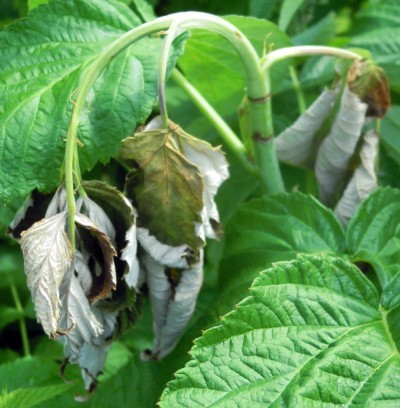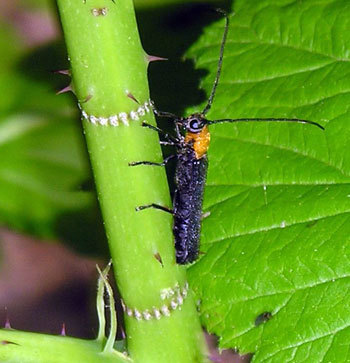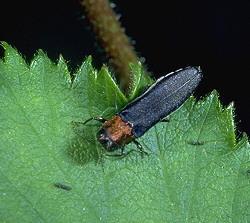I just found crown borers in every single one of my 2 yr old arapaho and ouachita blackberry plants. I’d say that 3/6 plants are toast. The other three may survive. I dug down and cut them out of the crown trying to preserve as much as possible. I suspect these are going to really make it tough to grow blackberries here. Im having trouble finding an unrestricted pesticide labeled for this. Anyone tried wrapping the canes with window screen?
Good idea to try out. Most of my borers enter at 1-14" high so if you could wrap your new canes ahead of the borer arrival you might solve the problem.
Don’t rank what I say on this like you would from someone who really knows pesticides. I think I recall reading the recommendation on one of the extension services last year.to use an imidocloprid soil drench after the harvest period.If you want to check it out, it would have been under their commercial growing recommendations. I rarely find their pages for backyard growers very helpful when it comes to pest control advice.
I was inspecting our raspberry and blackberry plants the other day, preparing to prune them (the raspberries at least; husband will probably do the blackberries as they are his project). They were just planted last spring. I saw evidence of borers on a few plants of each. If I cut out the affected cane at the base, will that ensure that I am removing the borer (so it can’t multiply)? If I do leave the canes, will they bear? These are young plants with only a few canes and in most of the cases the borer bulge is in the largest or main cane.
I decided to post here though it’s an old topic, to see if anyone has had success with the methods that have been mentioned (injecting into the swelling, wrapping canes early in the season) etc. as I’d certainly like to get on top of this problem. I’ve grown raspberries before at a different property for years and never had borers. I suspect that the wild black raspberries and blackberries that were growing on our property probably were the hosts (we tried to remove as many as we could).
This last image I am not sure if this is a borer or a disease. Input appreciated!
The first and the last pictures look like the old canes. They have two years cycle and need to be cut after that. The middle one might be a freeze damage.
You can leave them, spray plants with an insecticide and sticker. The adults emerge in mid to late June. Spray before flower bloom. The infected canes might not produce well. The young newly emerged beetles feed on leaves, so spraying will kill them. Removing infected canes now, will too! Those swellings are typical of the rednecked borer, another the raspberry borer exists too. Both like raspberries, blackberries, and roses. Both beetles look a lot alike, sort of like a lightning bug.
I left mine last year, and canes produced, but were weak, and production low. I sprayed leaves, put grub killer on the ground too. One that was safe around edibles. I don’t see any now. I just looked yesterday. I also removed all of my fall bearing canes last year. I usually harvest two crops from them, but to eliminate pest, I decided to have a lean raspberry year to fight these guys. I do have summer bearing and loads and loads of blackberry plants, all look great right now, all look alive too, surviving another winter, zone cheating with wilt stop seems to have worked for a third year, I will know more once growing. But I’m fairly convinced spraying zone 7 brambles with wilt stop in zone 5b works well.
The raspberry cane borer starts laying eggs near the tip. If you have canes that wilt, look for the red rings. RCB will mark where she lays eggs. Cutting these out will remove eggs.


Rednecked cane borer - tend to infect lower areas, you have this one for sure! You might have both??

They are canes from last year, but only 1 year old. The plants were planted last spring and everything grew new from then.
Do you have a recommendation for an insecticide that will kill them? We try to use as much low impact/organic products as possible but sometimes the key is knowing what will kill what!
I will probably remove the canes. I really don’t want this problem to get out of hand and we won’t get a lot of berries this year anyway since the plants have only been in the ground a year.
Roses, huh? I will have to look at the few plants that are here – there were some left by the previous owner when we moved in-- I have a feeling I might have seen these swellings on them but didn’t know what they were.
If this is the rednecked cane borer (the swellings are near the base of the plant so that sounds logical) are there early signs of infection like the raspberry borer or is spraying the only preventative?
Thanks so much for the response!
Yes, very true. Spinosad kills beetles, is organic. I don’t use it, but it is a good one from all accounts.
I use Lanbda-cyhalothrin, not organic, but based on an organic, I also use it for PC on my nectarines too.
Cyhalothrin is an organic compound that is used as a pesticide. It is a pyrethroid, a class of man-made insecticides that mimic the structure and insecticidal properties of the naturally occurring insecticide pyrethrum which comes from the flowers of chrysanthemums. Synthetic pyrethroids, like lambda-cyhalothrin, are often preferred as an active ingredient in insecticides because they remain effective for longer periods of time.
Removing canes is adequate for prevention. You do not have to spray anything. My suggestion was for if you leave them. Others felt it was not enough, I did both last year. Sprayed, and removed canes. And in the fall I removed all everbearing raspberry canes. They were weak from the dry summer, and infection, so I’m trying to renew them. I may still have to treat area, we will see…


